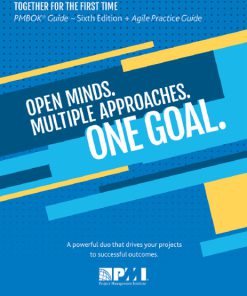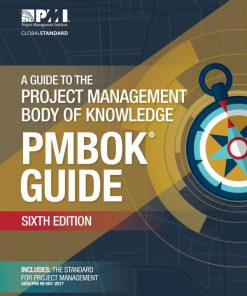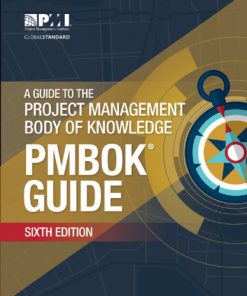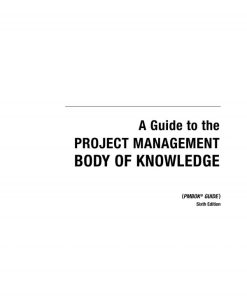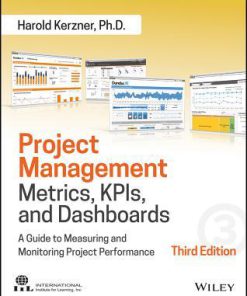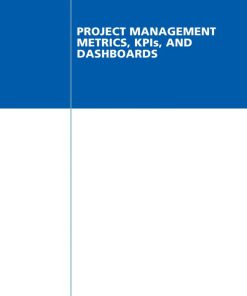Knowledge and Project Management A Shared Approach to Improve Performance 1st Edition by Meliha Handzic 3319510675 9783319510675
$50.00 Original price was: $50.00.$25.00Current price is: $25.00.
Knowledge and Project Management A Shared Approach to Improve Performance 1st Edition by Meliha Handzic – Ebook PDF Instant Download/DeliveryISBN: 3319510675, 9783319510675
Full download Knowledge and Project Management A Shared Approach to Improve Performance 1st Edition after payment.
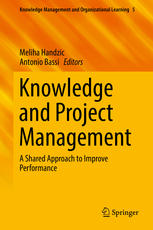
Product details:
ISBN-10 : 3319510675
ISBN-13 : 9783319510675
Author: Meliha Handzic
This book argues that by integrating effective knowledge management (KM) with project management (PM), the overall project success rate can be improved significantly. It brings together the latest ideas and research on shared approaches to improve performance based on the research and experience of academics and practitioners. The structured collection of articles presents novel theoretical approaches and clear empirical evidence of the value of integrating the two distinct fields. It enables readers to better understand the need to merge KM with PM and appreciate the benefits. It also offers researchers an idea of what lies ahead and how to get there, and helps practitioners develop more suitable KM solutions for successful project outcomes.
Knowledge and Project Management A Shared Approach to Improve Performance 1st table of contents:
Part I: Concepts and Models of Project and Knowledge Management
Traditional Project Management
1 Introduction
2 Framework vs. Standard vs. Methodology
3 Methodology Structure in Traditional Project Management Methodology
4 Traditional Project Management Method Overview
4.1 Project Concept and Start
4.2 Project Analysis and Feasibility
4.3 Project Staffing and Design
4.4 Project Development
4.5 Project Verification and Validation
4.6 Project Product Training Phase
4.7 Post Deployment Phase
5 Traditional Project Management Methodologies Examples
5.1 PMI-PMBOK
5.2 PMBOK Guide and PMP
6 Prince2
7 Six Sigma
8 The Pros and Cons of the Methodology
Integration Models of Project Management with Knowledge Management
1 Introduction
2 Integrated KM-PM Model by Yeong and Lim (2010)
2.1 Project Knowledge Sharing Contribution to Project Success
2.2 Continuous Learning Contribution to Project Success
2.3 Knowledge About Project Risk as a Contribution to Project Success
2.4 KM in PM: Conceptual Model
3 Integrated KM-IC-PM Model by Handzic and Durmic (2015)
3.1 KM Model
3.1.1 Integrated KM Model
3.2 PM Model
3.2.1 Project Aspects of PM
3.2.2 People Aspect of PM
3.2.3 Critical PM Factors and Project Success
3.3 IC Model
3.3.1 Merged Model of KM-IC-PM
4 The Concept of Project Knowledge Management
5 Conclusion
Literature
Part II: Project Management Knowledge Areas
Project Management Body of Knowledge in the Context of PMI and ISO
1 Introduction
1.1 Knowledge Assets
1.2 Standards and Norms
2 Project Management
2.1 Knowledge Areas
2.1.1 Project Integration Management
2.1.2 Project Scope Management
2.1.3 Project Time Management
2.1.4 Project Cost Management
2.1.5 Project Quality Management
2.1.6 Project Human Resource Management
2.1.7 Project Communications Management
2.1.8 Project Risk Management
2.1.9 Project Procurement Management
2.1.10 Project Stakeholder Management
2.2 Project Processes
3 Issues and Challenges
4 The ISO 10006 Approach
5 Conclusions
References
Emotional and Spiritual Knowledge
1 Introduction
2 The Beauty of Metaphorical Thinking
2.1 Knowledge Metaphors
2.2 The Energy Metaphor
3 Emotional Knowledge
3.1 Cognition and Emotion
3.2 Emotions, Feelings and Emotional Knowledge
4 Spiritual Knowledge
4.1 Spirituality
4.2 Spiritual Knowledge and Spiritual Intelligence
5 Practical Examples
5.1 Managing Change
5.2 Samsung Way
5.3 Antimanagement
6 Conclusions and Further Research
References
Part III: Knowledge Management Strategies for Project Management
Lessons Learnt Support System
1 Introduction
1.1 KM for PM
1.2 Lessons Learnt
2 Best Practices: What Are They?
3 Lessons Learnt Support Systems
3.1 Design and Implementation
4 Focus on “Collection´´ Function: A Concrete Method
4.1 The Email World for Project Managers: Some Lessons Learnt
4.2 Project Managers During an Emergency: Some Lessons Learnt
4.3 Project Managers with Contractual Promises and Disappointments: Some Lessons Learnt
4.4 Project Managers Are Grappling with the Scope: Some Lessons Learnt
4.5 Project Managers and the Plan: Some Lessons Learnt
4.6 Project Managers Inside Financial Data: Some Lessons Learnt
4.7 Project Managers and the Quality: Some Lessons Learnt
4.8 Project Managers and Their Team: Some Lessons Learnt
4.9 Project Managers Need to Communicate: Some Lessons Learnt
4.10 Project Managers Have to Minimize Any Risk: Some Lessons Learnt
4.11 Project Managers and Their Relation with the Top Management: Some Lessons Learnt
4.12 Project Managers and Transversal Knowledge: Some Lessons Learnt
5 Simulation
6 Conclusion
Bibliography
Renovating Project Management: Knowledge Personalization and Sharing
1 Introduction
2 Critical Issues in Formal PM
3 KM Views of PM
3.1 PM as a Codification Strategy
3.2 PM as a Personalization Strategy
3.3 PM as a Sharing Strategy
4 Reconsidering PM: Empirical Research
4.1 Goals and Methodology
4.2 Timeline, Methodology of Data Collection, and Variables
5 The MORPHEUS Project
5.1 The 2015 Edition
5.2 Kick-Off
5.3 Initial Perceptions and Competencies
5.4 Team Organization and Its Progressive Changes
5.5 Interaction Tools and Mechanisms of Knowledge Exchange
5.6 KM Issues
5.7 End of 2015 Teamwork
6 The 2016 Team
6.1 Final Lessons from Team 2016 Experience
7 Discussion
8 Conclusions
References
Part IV: Knowledge Management Implementations in Project Management
Knowledge Management Selection Model for Project Management
1 Introduction
2 Literature Review
2.1 Organisational Perspectives of a Project
2.2 Contingency Approach to Project Management
2.3 Description of Knowledge-Based Contingency Model of Project Management
3 Empirical Studies
3.1 Study1: The Role of Project Complexity in the Impact of Knowledge Capital on Project Success
3.1.1 Introduction
3.1.2 Project Success Measures and Factors
3.1.3 Research Methodology
3.1.4 Results
Demographic Information
Project Success by Project Complexity
Importance of Knowledge Capital by Project Complexity
3.1.5 Discussion
Main Findings
Implications for Research and Practice
Limitations and Future Directions
3.1.6 Concluding Remarks
3.2 Study 2: The Role of Project Complexity in the Selection of Knowledge Management Strategy for Ad
3.2.1 Introduction
3.2.2 Research Concepts and Model
3.2.3 Research Methodology
Research Design and Instrumentation
Research Subjects and Procedure
3.2.4 Results
Demographic Information
Knowledge Gaps
Preferred KM Strategies
Importance of Project Complexity in KM Strategy Choice
3.2.5 Discussion
Main Findings
Implications for Research and Practice
Limitations and Future Directions
3.2.6 Concluding Remarks
4 Overall Contributions and Recommendations
References
Knowledge Sharing System Under Open Project Perspective: Chinese Experience
1 Introduction
2 Knowledge Sharing into Open Innovation Perspective of Projects
3 Development of Chinese Current Knowledge Sharing System
3.1 Inter-organizational Perspective
3.2 Organizational Perspective: Huawei Case Study
4 Conclusion
People also search for Knowledge and Project Management A Shared Approach to Improve Performance 1st:
project management process groups and knowledge areas
project management processes and knowledge areas
what is knowledge management in project management
project management groups and knowledge areas mapping
what are the knowledge areas of project management
Tags: Knowledge, Project Management, Shared Approach, Improve Performance, Meliha Handzic
You may also like…
Uncategorized
Business & Economics - Project Management
Business & Economics - Management & Leadership
Project Management A Systems Approach to Planning Scheduling and Controlling Harold Kerzner
Business & Economics - Management & Leadership
A Guide to the Project Management Body of Knowledge PMBOK Guide Project Management Institute
Business & Economics - Management & Leadership
Business & Economics
A Guide to the Project Management Body of Knowledge Project Management Institute
Uncategorized
A Guide to the Project Management Body of Knowledge PMBOK Guide Project Management Institute
Business & Economics - Management & Leadership
Business & Economics





